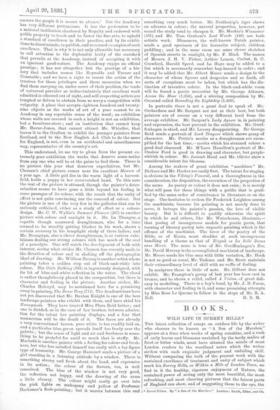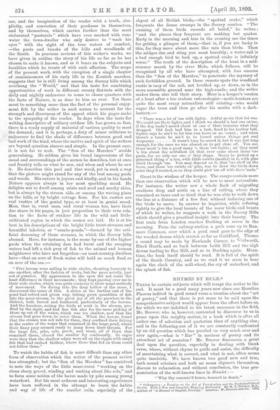BOOKS.
WILD LIFE IN SURREY HILLS.* THE latest collection of essays on outdoor life by the writer who chooses to be known as " A. Son of the Marshes," appears at a time when weeks of spring sunshine, and a rush of early leaves and blossoms unvisited by the tardy malice of frost or bitter winds, must have attuned the minds of most London readers to the woodland notes which the writer strikes with such exquisite judgment and unfailing skill. Without comparing the bulk of the present work with the sustained excellence of treatment and unity of subject which mark his Surrey Hills, or Within a Mile of London Town, we find in it the healthy, vigorous enjoyment of Nature, the sustained power of seeing only the most beautiful, the moat refreshing, and moat cheering pictures that the fairest parts of England can show, and of suggesting these to the eye, the
• Forest Tithes. By "A Son of the Marshes." London ; Smith, Elder, and Co. ear, and the imagination of the reader with a truth, sim- plicity, and conviction of their goodness in themselves, and by themselves, which carries further than the most elaborated " pastorals " which have ever mocked with rose- water the town-dweller who only desires to " wash his eyes " with the sight of the true waters of comfort, —the pools and brooks of the hills and woodlands of the South. In previous reviews of this writer's works, we have given in outline the story of his life so far as he has chosen to make it known, and as it bears on the subjects and localities which he treats of with such affection. The scope of the present work, with the exception of a single chapter of reminiscences of his early life in the Kentish marshes, suggests that he is still living among the Surrey hills which overhang the " Weald," and that his taste for combining opportunities of work in different county districts with the daily and nightly endeavour to come to closer quarters with the facts of Nature, is as dear to him as ever. Yet there must be something more than the fact of the personal enjoy- ment felt by the writer in such scenes to account for the strength and directness of the appeal which his pages make to the sympathy of the reader. In days when the taste for writing descriptive of solitary outdoor life has grown so fast, there is a ready supply of material of various quality to meet the demand; and it is, perhaps, a duty of minor criticism to endeavour to find the shade of difference between good and bad work of the kind, where the motive and spirit of the writers are beyond question sincere and simple. In the present ease, it is not far to seek. The "Son of the Marshes" avoids generalising. He seldom gives his broad impressions of the mood and surroundings of the scenes he describes, but at once and frankly tells us what he saw, and when and where he saw it. He describes this pool and that wood, yet in such a way that the pioture might stand for any of the best among pools and woods. His nature is joyous and kindly, and in his hands Nature appears always in her most sparkling mood. He delights not to dwell among mists and mud and murky skies, but is always by the stream side, or among the waving pines on the hills, or by bright cottage fires. For his rustics are real rustics of the genial type, or at least in genial mood. Man, that is, rural man, and rural woman too, have their due share in his pages, in just proportion to their true rela- tion to the facts of outdoor life in the wild and little- cultivated region in which the scenes are laid. He is at his best in his descriptions of the bright little trout-streams and beautiful lakelets, or " combe-ponds,"—formed by the arti- ficial damming of those streams, in which the Surrey bills abound. Here, for instance, is the scene by one of the higher pools when the retaining dam had burst and the escaping waters had left a rich prey of fish to the animal and human neighbours who have not forgotten—as most country-dwellers have—that an acre of fresh water will hold as much food as an acre of the sea:— "Five herons were sailing in wide circles, shouting hoarsely to one another, after the fashion of rooks, but far more noisily, just out of gunshot. My appearance in the open did not cause the least difference in their movements ; they kept passing over me in their wide circles, which was quite contrary to their usual methods of movement. On diving into the deep hollow of the moor, I discovered the cause of this. A sluice at the further end of the pond had rotted and given way, letting great quantities of fish into the moor-stream, to the great joy of all the prowlers in the district, both furred and feathered, particularly of the herons. And the foresters, noting the birds at work in the stream, pro- fited by the sight, and had fine fish also for the mere picking of them up out of the water, which was too shallow, now that the stream had gone down, to cover them. When the herons found that the stream was not safe for them, they confined their fishing to the centre of the water that remained in the large pond, where their finny prey seemed ready to jump down their throats. For the large fish, pike, eels, perch, and trout, all of them that remained there, chased the smaller fry continually. So eager were they that the shallow edges were all on the ripple with small fish that had rushed thither, where those that fed on them could not follow them."
To watch the habits of fish is more difficult than any other form of observation which the writer of the present review has attempted; but the "Son of the Marshes" has contrived to note the ways of the little moor-trout "working on the clean sharp gravel, winding and rooting about like eels," and to form some notion of the havoc made by pike among young waterfowl. But his most arduous and interesting experiences have been suffered in the attempt to learn the habits and way of life of the smaller ,rails, especially of the shyest of all British birds,—the " spotted crake," which frequents the dense swamps in the Surrey combes. " The cunning of these birds exceeds all belief," he writes ; " and the places they frequent are nothing but quakes. Early in the morning and late in the evening are the times for getting a glimpse of them,—that is, if you are lucky in this, for they move about more like rats than birds. Then the midges rise and sting you most horribly; a water-rail is a bad enough bird to look up, a spotted crake is infinitely worse." The truth of the description of the hunt in a mid- summer marsh by the river Mole, which follows, will be recognised by all who have attempted, with less success than the " Son of the Marshes," to penetrate the mystery of such forbidden ground. In these remote spots the woodland rustic is racy of the soil, not levelled up, or down, as in the more accessible ground near the high-roads ; and the writer makes them also tell their story. Here is a keeper's version of a hunt after a too zealous entomologist—moth-hunters are quite the most crazy naturalists still existing—who would sugar the trees and then go after his moths with a dark- lantern :— " There was a lot of 'em with lights. Artful as sin that lot was. We could see their lights, and I think we should 'a had one on'em, if the dog hadn't nosed about at one o' their lanterns what they dropped. Old Jack had him in a lash, fixed to his leather belt. Squire says he ain't to let him run loose on no 'count ; and when there's a tussle he ain't to be loosed unless things get real
desperate It warn't long he nosed it, but it was jest long enough for the ones we was almost on to get clear off. You see, there must 'a bin a good many 'o them 'ere lights ; an' they must 'a bin about the artfullost lot that ever come about these 'ere parts, for we only see one o' they chaps. Harry he picked up a gimcrack thing o' a box, with little owlets (moths) in it, with pins stuck through 'em. You may depend on it, that 'ere stuff on the trees, and them 'ere owlets on' pins, was to draw the birds down arter they'd roosted, so as they could pick 'om off with their 'ands."
Great is the wisdom of the keeper. The essays contain more than one observation which will be new to most naturalists. For instance, the writer saw a whole flock of migrating swallows drop and settle on a line of railing, where they remained so tame and so tired that he was able to walk down the line at a distance of a few feet without inducing one of the birds to move. In answer to inquiries, while refusing rightly to give the local haunts of the rarer birds and beasts of which he writes, he suggests a walk in the Surrey Hills which should give a practical insight into their beauty. The first train from London reaches Dorking at seven in the morning. From the railway-station a path runs up to Ran- more Common, over which a good road goes to the edge of the wooded downs which stretch as far as Guildford., Thence a round may be made by Newlands Corner, to (Jhilworth, Black Heath, and so back between Leith Hill and the high downs leading to Box Hill, and so to Dorking again. Mean- time, the book itself should be read. It is full of the spirit of the South Country, and as we read it we seem to hear again the clack of the mill-wheel, the cry of waterfowl, and the splash of fish.



















































 Previous page
Previous page